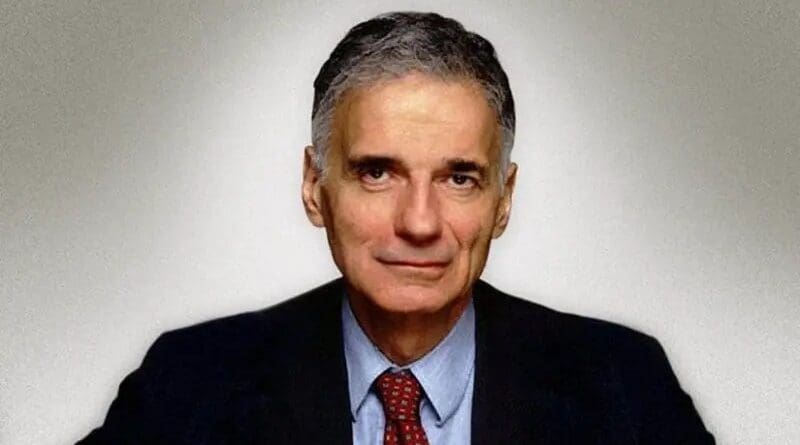Ralph Nader: Insurers Can Be Sentinels For Health And Safety – OpEd
By Ralph Nader
For nearly thirty-five years, a small nonprofit organization in Washington, D.C. has been having an outsized impact on highway and auto safety. It is Advocates for Highway and Auto Safety (saferoads.org) and it is funded by a dozen or more property-casualty insurance companies; with a board composed of consumer leaders and insurance company representatives.
Its origins were truly unique. After this industry lost a bruising California referendum in 1988 to consumer advocates, that brought successful regulation to the industry – saving motorists over $150 billion to date – some company executives wanted to look better to their customer public and agreed to start Advocates.
Instead of sulking, these companies, which included Liberty Mutual, Nationwide, State Farm and Allstate, picked up on the historic “loss prevention” mission of insurance companies from the early days of the Industrial Revolution. As factories were being built in the 1800s with boilers prone to exploding and starting fires, the early property insurance companies hired engineers to develop upgrades in boiler design and construction. Insurers would only provide coverage to companies that met the new standards. That is how the industry defined “risk management.” Dangerous factory boilers meant unacceptable insurance losses.
As the decades rolled by, the industry prospered, making profits year in and year out. So much so that its reserves bulged and investment of these monies began to overshadow net premium income. Insurance executives began to view themselves more as heads of financial companies than as underwriting companies pressing for safer factories, automobiles, building codes, fire prevention and other “loss prevention” attentiveness.
Advocates, with an annual budget of only $2.5 million, concentrated on authentic “risk management,” which means safer motor vehicles, highways and driver behavior. They had something going for them that prevails in our “democracy deserts” where bad conditions go unchallenged. Call it “low-hanging fruit” or improvements already tested and successful in certain localities or on certain products that have not spread to the country as a whole.
Working with the Center for Auto Safety and some small coalitions specializing in confronting heavy truck hazards such as overworked and sleep-deprived big truck drivers, Advocates has saved many thousands of lives, diminished the number of injuries and saved tens of billions of dollars in prevented costs that flowed from bloodshed on the highways.
Now Advocates is pressing, with limited success, for an adequate National Highway Traffic Safety Administration (NHTSA) budget, beyond the current meager one percent of the U.S. Department of Transportation’s annual budget, even though 95 percent of transportation-related fatalities involve motor vehicles.
Since 1968, NHTSA-mandated safety standards for motor vehicles (seat belts, rollover and side protections, airbags, etc.) continue saving lives every day.
In 2020 the Pacific Institute for Research and Evaluation (PIRE) issued a 30-year report on the impact of Advocates with their driving forces – Joan Claybrook, Jackie Gillan and Judith Stone. Although the report’s evaluation doesn’t quantify everything, its authors documented the tremendous impact of these standards. Advocates contributed to the passage of 444 state laws and blocked the repeal of at least 66 bills, the authors found. All dealt with improving safety through federal, state and local actions such as better truck brakes, stopping more states from allowing double and triple-trailer trucks, and increasing the use of safety belts, child safety seats, booster seats and motorcycle helmets.
Lobbying Congress, Advocates helped pass mandates for NHTSA standards, including stronger head impact padding, side airbags and the clear life-saver called “Electronic Stability Control” (ESC), along with tire pressure monitoring and crashworthiness standards for passenger-carrying motor coaches.
In sheer dollars saved by the economy when casualties are prevented or mitigated, the PIRE report has this to say: “The cost savings associated with the portion of Advocates’ effort mentioned in this report are stunning: they total $1,629 billion in 2019 [since 1990]. These efforts have saved the government alone $158 billion, with Medicaid and Medicare claims payments dominating the government savings.”
“Advocates’ safety activities in this report also resulted in substantial savings to the insurance industry that reduced insurance claims payments and claims processing costs by $773 billion. The bulk of the insurance savings went to auto insurers.”
With all this, it is puzzling that the insurance industry does not publicize widely such achievements. It is also puzzling why alert insurance companies like Geico and Progressive have not yet become participant donors.
At a time when insurance companies are losing public favor for hiking their premiums, in addition to homeowners’ insurers pulling out of climate disaster regions such as Florida, one would think they would tout the kind of loss prevention contributed by Advocates. Policyholders should demand explanations.
Advocates’ work is a luminous illustration of many other areas of loss prevention that insurance companies and their numerous company foundations can support. I listed many such opportunities for this industry to shine in my article for the Suffolk University Law Review in 1987, titled “Loss Prevention and The Insurance Function.” (See, https://sites.suffolk.edu/lawreview/). Opportunities exist not just for the property-casualty companies, but for health insurance and life insurance companies as well. Adding independent political muscle to their own self-interest could overcome obstacles to insured industries unwilling to change their ways.
Becoming major sentinels for health and safety takes corporate statesmanship and vision. There were motivating precursors. The industry established the Underwriters Lab for testing equipment in the late 19th century. Liberty Mutual challenged the auto companies with a prototype safer automobile built in the 1950s led by their vice president and chief engineer, Frank J. Crandell. Archie R. Boe, CEO of Allstate, championed airbag installation in the late 1970s. State Farm took NHTSA to the U.S. Supreme Court and won a unanimous decision overturning Reagan’s recession of NHTSA’s airbag regulation.
Plenty of more low-hanging fruit, insurers! What are you waiting for?

